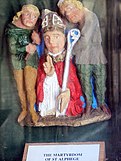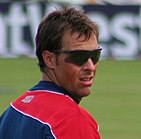Portal:Somerset/Nominate/Selected biography
If you wish to add an biography for rotation within this portal, please:
- Check its unofficial rating by a WikiProject; it must be B-class or higher to qualify.
- Add the biography in to a subpage of this portal, such as Portal:Somerset/Selected biography/#, replacing the "#" with the number above the current highest. For example, if 21 biographys are in rotation, you would make the number of the biography you are creating 22.
- Use the format:
{{Selected biography
| image =
| size =
| caption =
| name =
| born = <!--- Required if using "died" --->
| died =
| text = <!--- Required --->
| link = <!--- Required --->
| page =
| archive = no
}}
- Update the biography maximum parameter on the main Portal.
- If possible, please accompany the biography with a freely-licensed image (such as images released under the GNUFDL, Public Domain.) Fair use images are not permitted, per Wikipedia:Non-free content criteria.
- Update this list accordingly.
Selected biography
Portal:Somerset/Selected biography/2
Portal:Somerset/Selected biography/3
B. January 13, 1964
Portal:Somerset/Selected biography/5
In the mid 1970s, Cleese and his first wife
Portal:Somerset/Selected biography/6
Ælfheah of Canterbury
B. 954 – d. 19 April 1012
Portal:Somerset/Selected biography/7
Robert Burnell
B. c. 1239 – d. 25 October 1292
Robert Burnell (sometimes Robert Burnel) was an English bishop who served as Lord Chancellor of England from 1274–1292. A native of Shropshire, he served as a minor royal official before switching to the service of Prince Edward, the future King Edward I of England. When Edward went on the Eighth Crusade in 1270, Burnell stayed in England to secure the prince's interests. He served as regent after the death of King Henry III of England while Edward was still on Crusade. He was twice elected Archbishop of Canterbury, but his personal life prevented his confirmation by the papacy. In 1275 he was elected Bishop of Bath and Wells, after Edward had appointed him Lord Chancellor in 1274. (Full article...)
Portal:Somerset/Selected biography/8
Dunstan
B. 909 – d. 19 May 988
Dunstan who was born in Baltonsborough, was an Abbot of Glastonbury Abbey, a Bishop of Worcester, a Bishop of London, and an Archbishop of Canterbury, later canonised as a saint. His work restored monastic life in England and reformed the English Church. His 11th-century biographer, Osbern, himself an artist and scribe, states that Dunstan was skilled in "making a picture and forming letters", as were other clergy of his age who reached senior rank. Dunstan served as an important minister of state to several English kings. He was the most popular saint in England for nearly two centuries, having gained fame for the many stories of his greatness, not least among which were those concerning his famed cunning in defeating the Devil. (Full article...)
Portal:Somerset/Selected biography/9
Savaric FitzGeldewin
B. unknown – d. 8 August 1205
Savaric (sometimes Savaric FitzGeldewin or Savaric FitzGoldwin or Savaric de Bohun) was an Englishman who became Bishop of Bath and Glastonbury in England. Related to his predecessor as well as to the German Emperor Henry VI, he was elected bishop on the urging of his predecessor, who urged his election on the cathedral chapter of Bath. While bishop, Savaric spent many years attempting to annex Glastonbury Abbey as part of his bishopric. Savaric also worked to secure the release of King Richard I of England from captivity, when the king was held by Emperor Henry VI. (Full article...)
When he returned to England, he continued to serve both John and John's son King
Portal:Somerset/Selected biography/13
Herbie Hewett
B. 25 May 1864 – d. 4 March 1921
Herbert Tremenheere "Herbie" Hewett was an English
Hewett was educated at
Hewett was a belligerent left-handed opening batsman who hit the ball with power, but was also inclined to be argumentative off the pitch. He had an excellent eye with an unorthodox style and was capable of demoralising the best bowling and running-up a good score in a very brief time. He tended to dominate the scoring while at the wicket and typically scored at about a run a minute. Although he only scored 7 first-class centuries in 4 of those he scored a hundred before lunch. (Full article...)
Seamer played the best of his cricket while at
Portal:Somerset/Selected biography/15
Edward Sainsbury
B. July 5, 1851 – d. October 28, 1930 (aged 79)
Edward Sainsbury was an English cricketer who represented, and captained, Somerset County Cricket Club in the late 19th century. During a 10-year first-class cricket career, he also represented Gloucestershire and the Marylebone Cricket Club (MCC).
Most commonly employed as a right-handed
Portal:Somerset/Selected biography/16
Stephen Newton
B. April 21, 1853 – d. August 16, 1916 (aged 63)
Stephen Cox Newton was an English cricketer who represented, and captained, Somerset County Cricket Club in the late 19th century. During a 14 year first-class cricket career, he also represented Cambridge University, Middlesex and the Marylebone Cricket Club (MCC).
He made his debut in first-class cricket for Cambridge University, where he was awarded his
Portal:Somerset/Selected biography/17
Marcus Trescothick
B. December 25, 1975
Marcus Edward Trescothick
Trescothick was an automatic choice for England between 2000 and 2006, before a stress-related illness threatened his career and forced him to pull out of the national squad. He began the process of rebuilding his career with Somerset in 2007, and scored two
His first-class career was confined to his university years, when he appeared for both Oxford and Somerset. Close to the top of the bowling averages for both teams in each season, his 62 first-class wickets in 1885 placed him among the 20 most prolific wicket-takers in the country. Somerset's temporary loss of first-class status in 1885 brought a premature end to Bastard's first-class career when he was 23. Although he continued to play for the side in second-class cricket until 1889, by the time Somerset resumed first-class cricket in 1891, Bastard had lost his place following the emergence of Sammy Woods and the acquisitions of Ted Tyler and George Nichols. He died at the age of 39 while engaged in scholastic work in Taunton. (Full article...)
Portal:Somerset/Selected biography/19
Portal:Somerset/Selected biography/19
Portal:Somerset/Selected biography/20
Portal:Somerset/Selected biography/20
Portal:Somerset/Selected biography/21
Portal:Somerset/Selected biography/21
Portal:Somerset/Selected biography/22
Portal:Somerset/Selected biography/22
Portal:Somerset/Selected biography/23
Portal:Somerset/Selected biography/23
Portal:Somerset/Selected biography/24
Portal:Somerset/Selected biography/24
Portal:Somerset/Selected biography/25
Portal:Somerset/Selected biography/25








